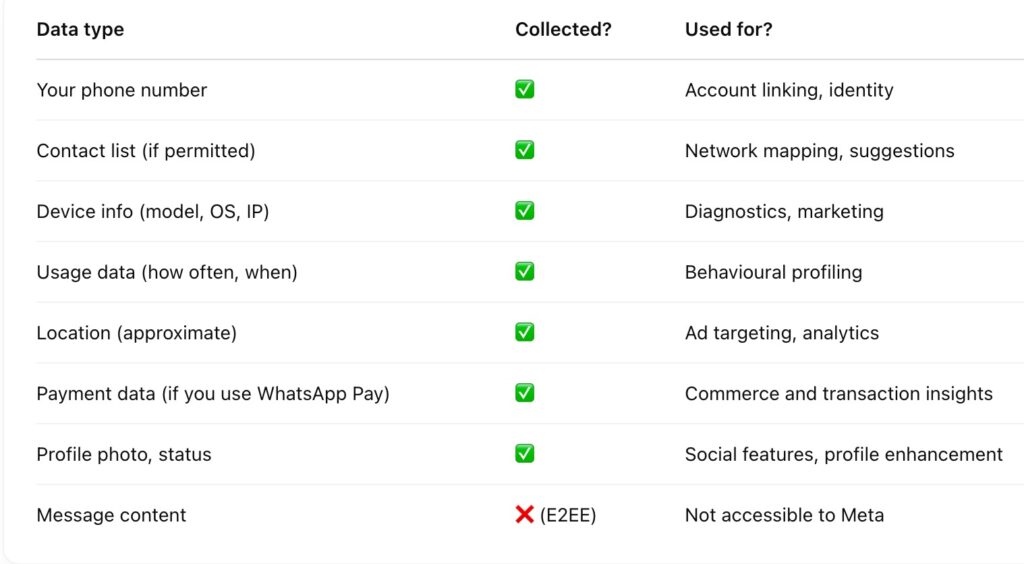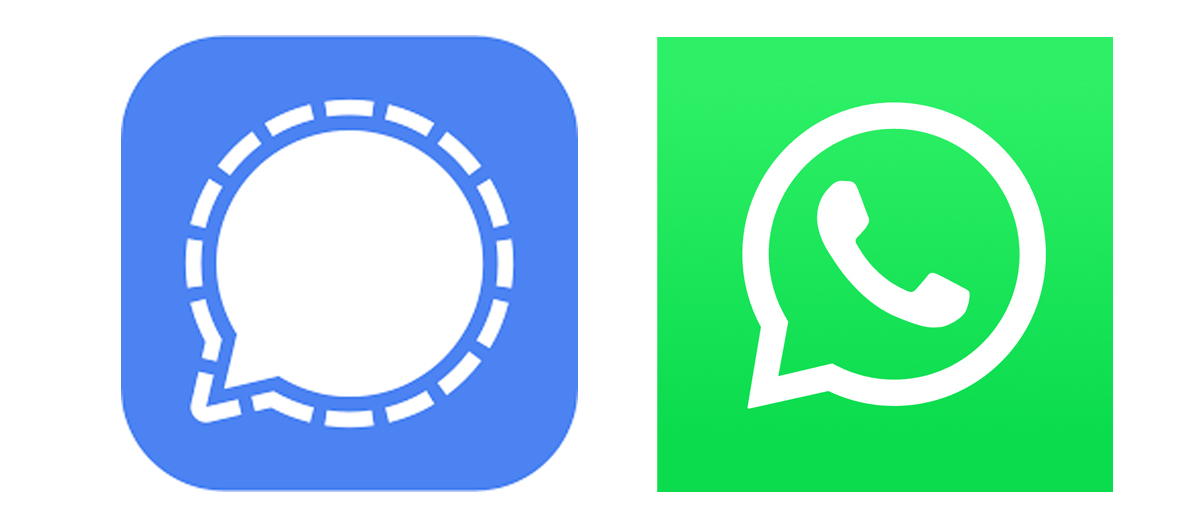WhatsApp. Is it really as bad as you say, Lee?
Yes, it is.
WhatsApp is part of Meta’s empire. Meta (formerly Facebook Inc.) acquired WhatsApp in 2014 for approximately US$19 billion, making it one of the largest tech acquisitions in history. Since then, WhatsApp has been integrated more deeply into Meta’s ecosystem alongside Facebook, Instagram, and Messenger.
Does Meta harvest your data via WhatsApp?
Yes—but with caveats.
WhatsApp encrypts your messages end-to-end, which means Meta cannot read the content of your messages, calls, photos, or videos. However, they do collect a significant amount of metadata, which can still be used to profile you.
Here’s a breakdown of what Meta collects through WhatsApp:

![]() While Meta cannot read your messages, they know who you’re talking to, when, how often, and from where—a powerful map of your social behaviour.
While Meta cannot read your messages, they know who you’re talking to, when, how often, and from where—a powerful map of your social behaviour.
What are the risks of manipulation by Meta if I use WhatsApp?
Using WhatsApp, especially if it’s linked with other Meta services (e.g. Facebook, Instagram), creates a web of data that can be used for:
- Behavioural profiling Your habits, interests, and associations are inferred from metadata and cross-platform activity.
- Targeted advertising While WhatsApp itself doesn’t show ads (yet), your WhatsApp activity can influence ads you see on Facebook, Instagram, and Messenger.
- Political or psychological influence As seen in the Cambridge Analytica scandal, and has been found to have been used in both Trump election campaigns, Meta has facilitated psychological profiling for political campaigns. While WhatsApp’s encryption offers some protection, the metadata can still be leveraged.
- Cross-platform tracking Meta creates “shadow profiles” across its platforms to serve personalised content and ads—even if you’re not logged in.
- Future monetisation risks WhatsApp may eventually integrate ads, e-commerce, or AI-driven services that erode privacy further.
What can you do to minimise these risks?
Limit permissions: Don’t share contacts, location, or unnecessary access.
Avoid linking accounts: Keep WhatsApp separate from Facebook and Instagram.
Use alternatives: Consider Signal or Telegram—Signal, in particular, has better privacy protections and is open source.
Check your privacy settings: Go to Settings > Privacy in WhatsApp and limit who can see your profile photo, last seen, and status.
Turn off cloud backups: Cloud backups (e.g. Google Drive or iCloud) of messages are not encrypted, and therefore accessible to third parties.
Summary: Who’s Best for Privacy?
![]() Signal
Signal
→ Best-in-class privacy and encryption. No ads, no profiling, no tracking. Independent and transparent. Recommended for activists, journalists, and privacy advocates.
![]() WhatsApp
WhatsApp
→ Strong encryption, but owned by Meta. Shares metadata across platforms. Acceptable for secure messages, but not ideal for privacy-conscious users.
![]() Telegram
Telegram
→ Not encrypted end-to-end by default. Stores messages on the cloud unless you use Secret Chats. Better than Facebook Messenger, but not ideal for true privacy.
🔹 Signal
- Website: https://signal.org
- Desktop App (macOS, Windows, Linux):
🔗 https://signal.org/download - Web Version: ❌ No web version—Signal requires the desktop app to pair with your phone.
- QR Code to link Signal Desktop: Shown within the Signal mobile app under Settings → Linked Devices
- Website: https://www.whatsapp.com
- Desktop App (macOS, Windows):
🔗 https://www.whatsapp.com/download - Web Version:
🔗 https://web.whatsapp.com - QR Code for WhatsApp Web/Desktop:
Visit https://web.whatsapp.com — the QR code appears there for scanning via the mobile app:
Open WhatsApp → Menu (⋮ or ⚙) → Linked Devices → Scan QR
🔹 Telegram
- Website: https://telegram.org
- Desktop App (macOS, Windows, Linux):
🔗 https://desktop.telegram.org - Web Versions (two options):
- https://web.telegram.org/k (modern version)
- https://web.telegram.org/a (alternative interface)
- QR Code Login:
- Go to https://web.telegram.org/k
- Choose “Log in via QR Code”
There’s a one-page pdf if you want to download and consider further: https://vietleadershipcoach.com/…/WhatsApp_Signal…
Below is a link to the latest of many books that expose what Meta and other tech giants are doing with the data you believe to be private. If you want to know how evil Meta is, read this book—it is chilling.
Note: I no longer publish my podcasts on Spotify because of their unethical behaviour; I am in the process of deleting all of my accounts at Facebook and keeping my Instagram as unhooked from Facebook as possible.


Comments